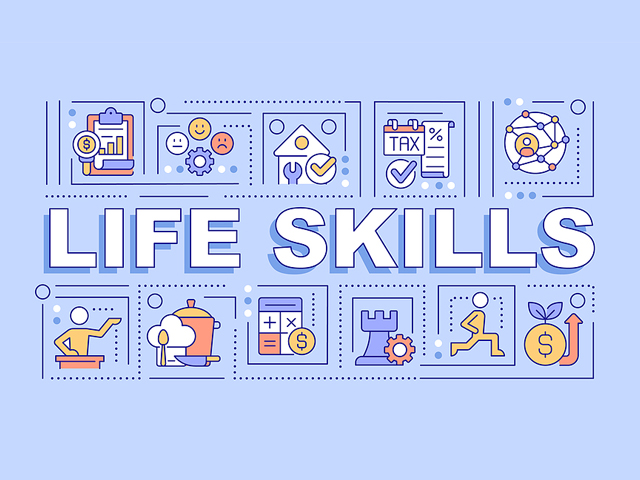
Some students will find adapting to college extremely challenging. Moving away from home and transitioning to campus life can be a lot easier if you consider these 9 essential skills.
1) Setting Goals
Set smart and attainable goals to increase your chances for success. Write your goals down to help them become realistic and check them off when you complete them. You want to establish short- and long-term goals that you will need to push yourself to finish. You will feel a sense of accomplishment and pride when you attain your goals. For larger goals, break them down into smaller pieces so that you can track your progress and make them more manageable.
2) Becoming Budget Savvy
Money management is a crucial skill that you will need to rely on for your entire life. Begin your budgeting exercise by estimating your expenses and your income. Next, prioritize your expenses such as food, shelter, gas or transportation costs, tuition and figure out how much money you need every month to pay for these costs. Any leftover money is what you can use for entertainment and other non-necessity items.
You might have to say no to that concert, new pair of boots, or movie night with friends but if you can plan accurately, you may be able to fit everything in. You might decide that you have the time and energy to earn extra cash through tutoring or a part-time job. Maybe you can sell some artwork or teach music lessons or house-sit for family friends during reading break. Perhaps, there is a work-study option you qualify for.
Learning to live within your means is not a dreadful drag, it is truly a gift to help you realize financial freedom. Racking up extra debt while attending college will only set you back further once you begin your career. Check your bank account regularly to see where you are at before you head to the grocery store or make a purchase. You want to avoid negative financial surprises.
3) Improve your Interpersonal Skills
You will be constantly interacting with people at college from professors, fellow students, landlords, instructors, coworkers, RAs and numerous others. Having great communication skills will help you maximize your relationships now and in the future. You are preparing for your career which will require interpersonal skills too. Use different social connections to help build your confidence and public speaking abilities.
4) Responsible Time Management Skills
One of the greatest challenges students face is managing their own time. Since there is no one reminding you to study, to go to bed on time, or to get up and get to class, it can be tricky to navigate for some people.
Discover how to prioritize your commitments and responsibilities effectively. This can help you be successful during your college career instead of feeling overwhelmed, stressed out and running late everywhere.
Break down your wakeful hours and see where and how you can accommodate cleaning, transportation, studying, food preparation, working, working out, socializing, computer time and keeping in touch with loved ones. Know that the list will look overwhelming at first but as long as you don’t try to cram everything into a single day, you will be alright. Look at your daily, weekly and monthly schedule to get a better grasp on what needs to be done.
Some people thrive on a schedule to help keep them on track. Others prefer to work on things when they are in the mood. Doing laundry on Sunday’s and grocery shopping after work or cleaning the bathrooms every Tuesday may give you a bit of structure to your week and help you free up some needed downtime.
5) Proper Roommate Etiquette & Boundaries
We’ve all heard stories of friendships failing or people leaving their lease early and choosing to pay a penalty because they couldn’t stand another day at home. Misery can be avoided if you set some clear boundaries before you move in with your new roommate.
Understand how to clean up after yourself for the ultimate roommate success. Taking care of bathrooms, shared spaces and kitchens is essential. Set up a cleaning schedule to tackle household tasks like taking out the garbage or using the laundry at specific times to avoid clashes. Lay down some house rules regarding quiet time and visitors.
Be sure to always respect each other’s property and personal space. Never use your roommate’s camera, phone, vehicle, computer, etc. without their permission. Establishing clear boundaries from the beginning will prevent people from blaring tunes late at night when you are trying to study or living in a mess.
6) Enhance Your Study Skills
You may have relied on memorization techniques during your high school studies. For college and higher-level education, you will need to conduct additional research, ask questions from teaching assistants and professors, take proper lecture notes and learn how to study for tests. Creating flashcards, pop quiz's and attending or launching study groups can help you focus on the various subject matter.
Determine when you are at your best and you retain information the strongest. Do you need to write things down? Do you need to read questions and answers out loud? Are you mindless trying to study on an empty stomach with low blood sugar? Are you dehydrated? Setting yourself up for successful study habits means understanding your optimum sleep, food and time of day productivity.
Do you need to take your books to work and study on your lunch break? Are you traveling on the bus or carpooling and able to read or review a few chapters there? Breaking up your tasks throughout the day or even repeating key elements in the shower may help you more than you anticipate.
7) Hone Your Networking Skills
An essential aspect to help you grow your career and advance your connections is networking. You may not be considering what life is like post-graduation at this time; however, it is never too early to expand your networking abilities.
Start small by learning how to ask for advice and how to introduce yourself. Look to popular social media sights including LinkedIn to help you brush up on your online resume and connect with people in your field. Joining relevant online groups and discussion boards can also help you connect.
8) Note What is and isn't Working
If you have problems arise, (which they inevitably will), take note. If you ran into financial issues, put the credit card away and take care of things. Maybe you can tutor students, teach a few music lessons, or earn some extra cash shoveling driveways.
If roommate woes have you down, maybe its’ time to review your lease or your location and consider a new plan.
If you are too busy with your school, work, and social life, maybe you need to cut back in a few places and get back on track.
If you can’t afford to eat out as often as you would like, get some friends together and organize some potluck meals or cook-offs. You can make large batches of cookies, lasagna, Shepard’s pie, sushi, and all sorts of healthy and nutritious meals that are freezer-friendly and fun to make with your friends.
9) Stay Positive and Flexible
The bottom line is to be flexible and positive. Seek solutions when you are feeling upset or overwhelmed. Understand that likely, most of your peers are experiencing some similar emotions from homesickness to falling behind in a class to feeling broke. You are not alone. You have the power to take charge and do things differently tomorrow. These situations are helping you grow and become an excellent critical thinker. Enjoy the ride.











